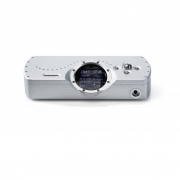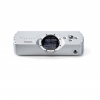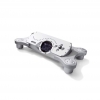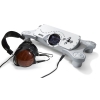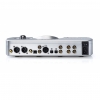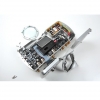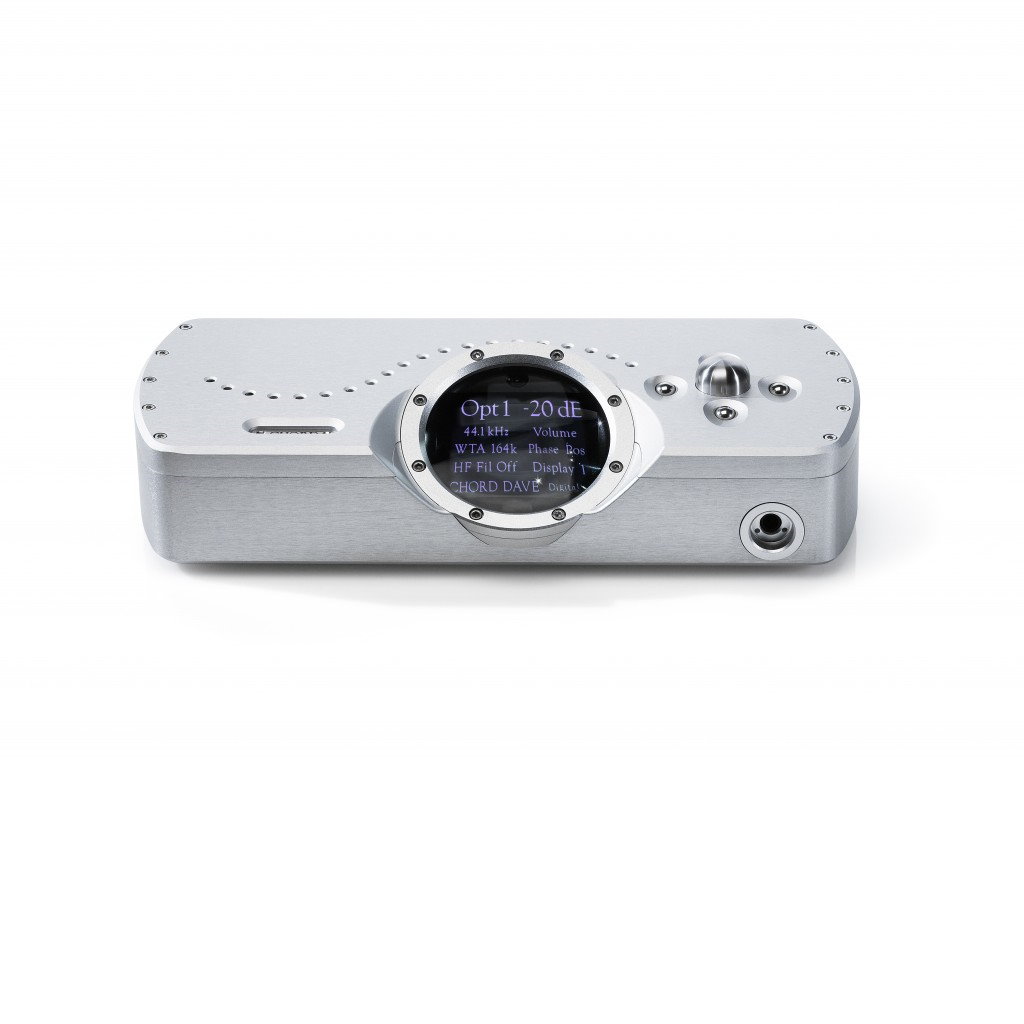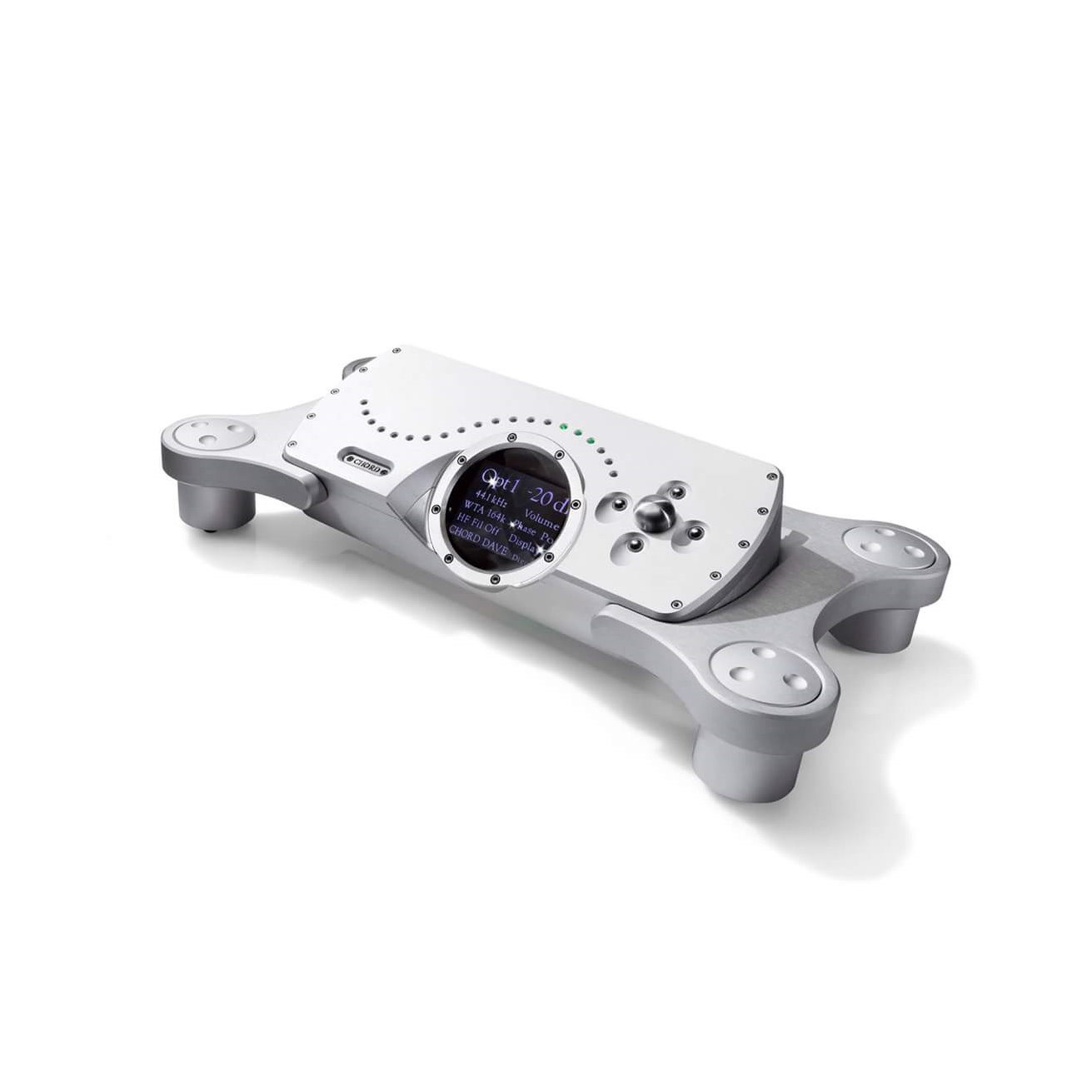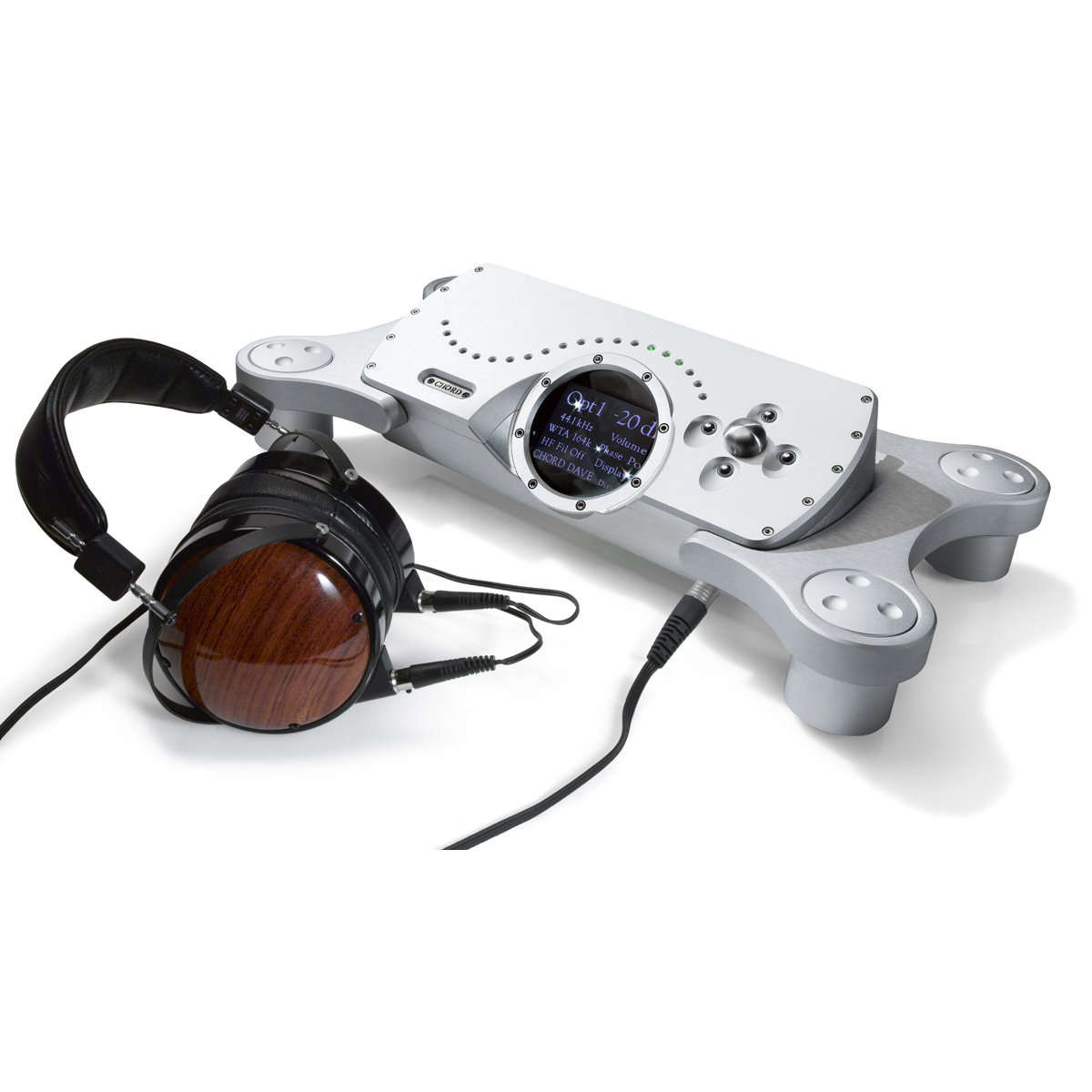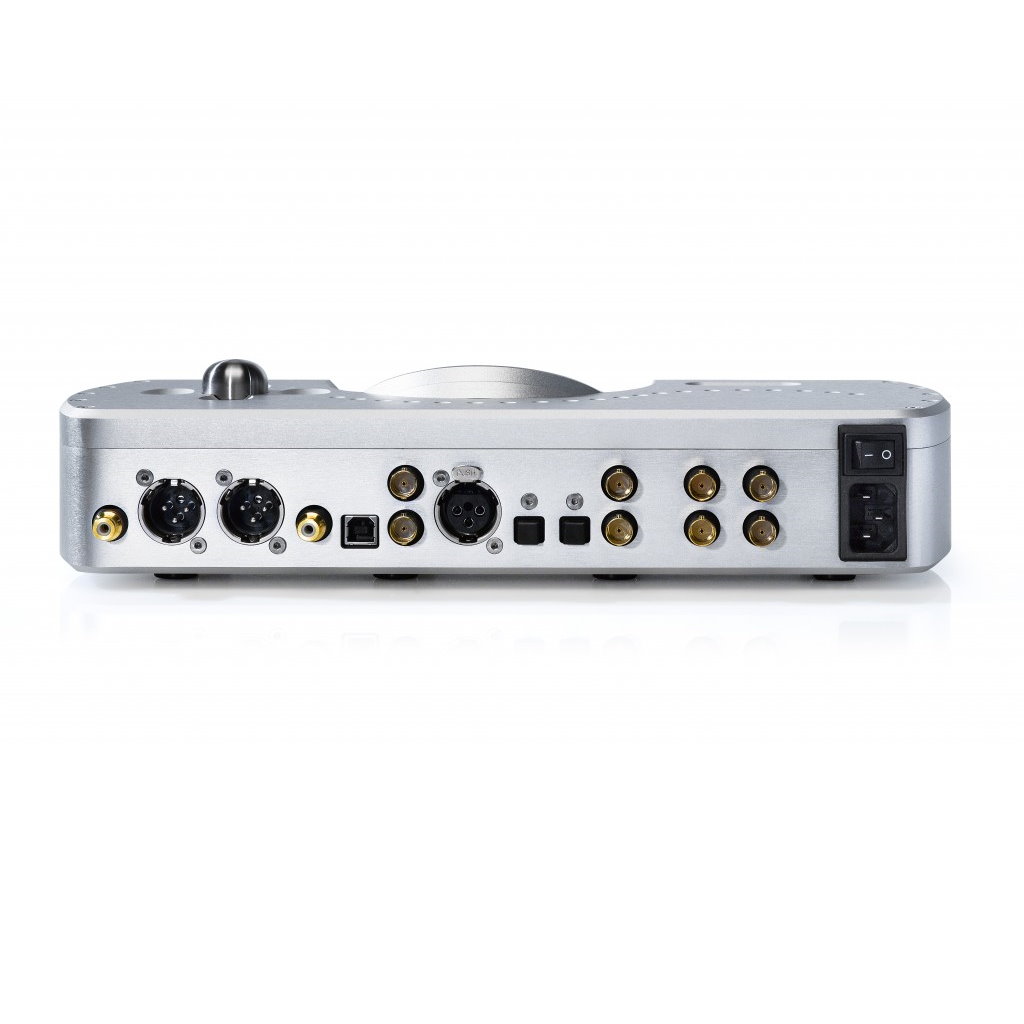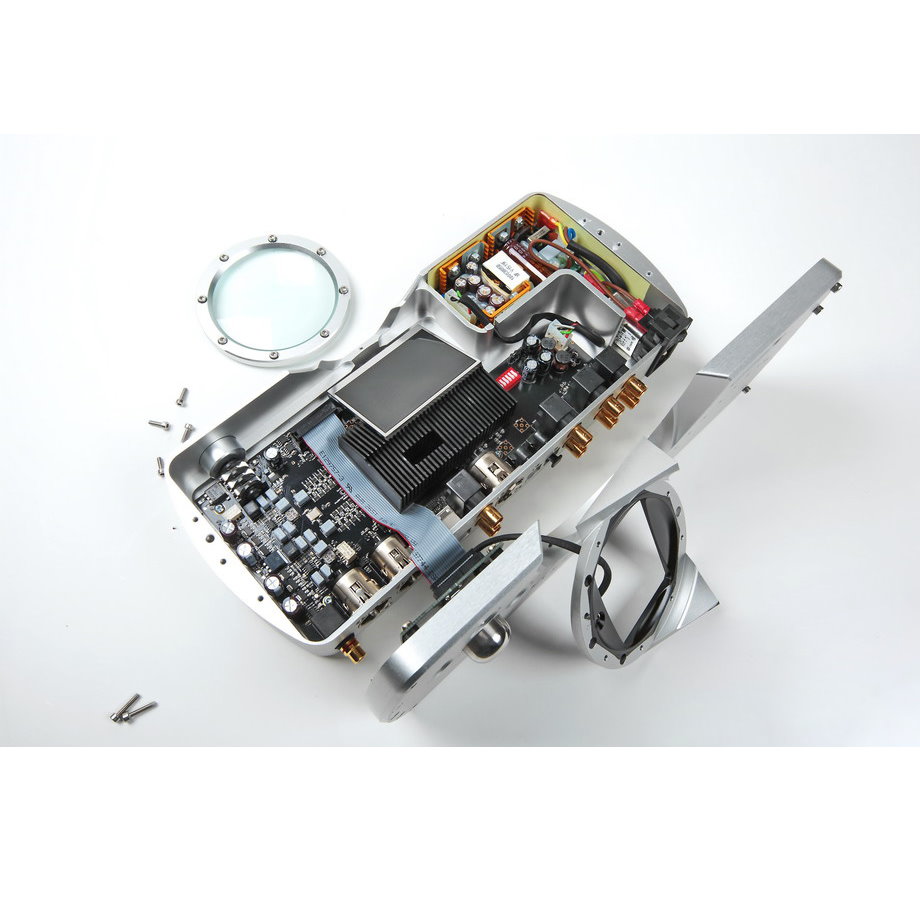- AUDIO ONE-TO-ONE Call Now: 210-805-9927
- Contact
- Register
- My Account
Chord DAVE Digital To Analog Converter and Headphone Amplifier
Chord DAVE Digital To Analog Converter and Headphone Amplifier
Chord DAVE Digital To Analog Converter and Headphone Amplifier
Not available online, please call to order.
210-805-9927
Chord DAVE Digital To Analog Converter and Headphone Amplifier
Not available online, please call to order.
210-805-9927
Description

MY TAKE: One of the most technically advanced DACs available, DAVE represents quite an achievement not only in terms of its technical sophistication but its exemplary performance. To be considered in the very top echelon of DACs. - Galen Carol
Chord Electronics has launched its most advanced DAC to date. Given the acronym DAVE, Chord's latest-generation digital-to-analog converter features the very best conversion technology available, using proprietary techniques never seen before.
DAVE is a highly advanced reference-grade DAC, digital preamp,https://parttimeaudiophile.com/2020/06/25/top-qna-with-digital-guru-rob-watts/ and headphone amplifier. Hand-made in Kent, DAVE is based around a proprietary FPGA (Field Programmable Gate Array) offering more than ten times the program capacity of its predecessor.
At its heart lies a new (and in electronics terms, huge) LX75 version of the Spartan 6 Field Programmable Gate Array (FPGA). The FPGA's extraordinary capability enables a number of key sonic benefits including significantly improved timing and the best noise-shaper performance of any known DAC. DAVE's technology delivers music with unmatched reality and musicality, with an unrivaled timing response.
REVIEWS:Stereophile A+ Recommended Component, October 2017 - In his system, the DAVE sounded so good that it tore editor JA away from editing: "Darned if I didn't have to go sit in the listening chair, so compelling was the sound produced by the DAVE." In particular, he praised the DAVE's "superb re-creation of soundstage depth, its sense of musical drive, and the clarity with which it presented recorded detail." Reporting from his test bench, JA wrote: "Even if I hadn't auditioned Chord's DAVE, I would have been impressed by this DAC. Its measured performance is beyond reproach."
HiFi+: "But what can it do? Put simply; it does it all. This, perhaps more than any DAC is digital done right. It has the same ‘wow!’ factor performance that sets the Mojo and Hugo apart from their respective competitors, but taken to a new level. If you are in the market for a DAC at this price and beyond (‘beyond’ extending up to about 10x the DAVE’s price) here’s how the demonstration goes: it is plugged in, you wait 20 seconds, listen for about 10 seconds more, and reach for the credit card. If you do this, have someone waiting with a camera or smartphone to record your facial expression during those 10 seconds, because you go from ‘WTF’ to ‘OMG’ and then ‘LOL’."
Everything – literally everything – you can throw at the DAVE musically is returned as best as you have ever heard it. OK, it doesn’t suffer musical fools gladly, and compressed recordings remain compressed, but even here the sheer amount of information the DAVE is extracting will make you reevaluate your music anew. Reviewers (unconsciously or otherwise) have a series of tick boxes they list when listening to a device: dynamics… tick, microdynamics… tick, vocal articulation… tick, detail… tick, and so on. Normally, these elements are rated on a scale and how they combine dictates both absolute performance and recommendation in terms of ‘fit’ into a system and the tastes of a listener. Good bass and fast transients might, for example, put a device into a ‘pacy, rhythmic’ system, where excellent imagery, good detail, and midband transparency would put it in a ‘traditional audiophile’ setting. The DAVE is that rare beast; a device that performs equally well in all these aspects of performance, and by ‘equally well’ we mean it does an outstanding, class-leading job in all parameters.
Perhaps beyond all other aspects of performance, what is so important about the Chord DAVE is that it represents a raising of the bar of what can be had from a digital device. It’s one of those rare products that throws down the gauntlet, both sonically and technologically. Yes, you can do a lot with an off-the-shelf variation on a theme of the application board that is supplied to digital engineers by the chip companies, but that only goes so far. Chord Electronics’ DAVE is one of the few devices that challenges that concept head on. And for that, I can put up with the electromorphising name. The DAVE gets the strongest recommendation we can muster!" - Alan Sircom
HiFiNews: “It doesn’t take much time with DAVE to realize that the sound here is every bit as impressive as all the clever stuff under the hood… every bit of that technical finesse is translated into the most remarkable music-making ability, whether with CD-quality files or content pushing the upper limits of today’s high-resolution offerings.
 "What struck me immediately was that DAVE ‘does’ piano, a notoriously difficult instrument to reproduce in any manner corresponding even slightly to the experience of sitting close to one being played in anger. I was immediately taken by the sheer scale and power of the instruments center-stage, to the point where one could hear the impact of hammer on string, the shifting of the dampers, everything.
"What struck me immediately was that DAVE ‘does’ piano, a notoriously difficult instrument to reproduce in any manner corresponding even slightly to the experience of sitting close to one being played in anger. I was immediately taken by the sheer scale and power of the instruments center-stage, to the point where one could hear the impact of hammer on string, the shifting of the dampers, everything."And wow, is this DAC both weighty and fast, capable of growling out the deepest bass notes while simultaneously untroubled by the speed and complexity of rhythms – traits as well suited to trio jazz as they are to large scale orchestral works.
"Simply, DAVE delivers remarkable instrumental timbres and detail, as for example when running in DSD+ mode to play the Cleveland Orchestra/Szell program of Wagner orchestral highlights in DSD64. These recordings sound just glorious with beautiful fluidity and bite, room-shaking dynamics, and shiver-inducing timbre and texture to that Wagnerian brass in the Gotterdammerung Prelude.
"‘Revelatory’ is a pretty strong term to describe a piece of hi-fi equipment, but that’s just what Chord’s DAVE is. Furthermore, while most of my listening was via the USB input from my dedicated Mac Mini, it’s just as striking when fed via the optical or coaxial inputs, and offers a remarkably good headphone amp into the bargain, with that crossfeed facility effective in making the sound much less ‘in the head’.
"A rare high score for Chord’s DAVE, but this is no ordinary digital-to-analog converter. From the handcrafted quality of its casework to the sheer quantity of proprietary engineering within, this is a standard-setting product, and when you hear it in action all that hard work – and the price – is more than justified by a scintillating performance. From lab to listening room, this is an outstanding product."
By any standards, this is a remarkable piece of equipment, but is it the best DAC you can buy right now? On this showing, I wouldn’t bet against it.” - Andrew EverardWhat HiFi: “It doesn’t take more than a few seconds of listening to realise that the DAVE is something special. It just sounds so right from the beginning that it genuinely takes effort to even try to deconstruct its performance. When we did, we found a formidable array of talents with no discernable weaknesses.
“Orff’s Carmina Burana is one of the most demanding pieces of music we know. It has savage dynamics coupled to complex instrumentation and varies from outright frenzy to angelic harmonies in the space of just a few seconds.
 “The DAVE takes it all in stride. This DAC renders a convincing acoustic – a believable space populated by the choir and instruments.
“The DAVE takes it all in stride. This DAC renders a convincing acoustic – a believable space populated by the choir and instruments.
“Sound staging is excellent. It is precise, layered and neatly arranged. More than that it’s stable, even when the music turns demanding. The tonal balance is similarly impressive being even-handed and utterly convincing.
“No part of the frequency range gets undue preference and there’s a lovely balance between attack and refinement.
“It’s the DAC’s dynamic ability that impresses us most with this piece. Not only does this DAC thump out crescendos with conviction, but it also goes from loud to quiet and back again with a grace and fluidity we have rarely heard from a DAC before.
“It paints music with class leading naturalness that makes most rivals sound mechanical and restrained in comparison.
“Switching to Dave Brubeck’s Take Five shows-off the Chord’s talented way with high frequencies. Cymbals shimmer, and are delivered with fully realised harmonics. There’s plenty of power when they’re hit and wonderful insight into their decay.
“We notice the excellent sound staging with this recording too, though it’s the DAVE’s excellent rhythmic ability that really stands out. It is truly terrific in this respect, delivering the timing relationships between the individual instruments brilliantly.” – What HiFi
Stereophile: "Darned if I didn’t have to go sit in the listening chair, so compelling was the sound produced by the DAVE. I hadn’t remembered there being so much depth to the soundstage, or the instruments being so securely rooted in the acoustic of the St. Francis Auditorium. The deep tolling bass notes of Barenboim’s unique straight-strung piano sounded majestic with the DAVE in the system. There was again superb soundstage depth, the woodwinds in particular were each set well behind the plane of the speakers.
"The DAVE indeed did very well with piano. On CD, Rachmaninoff’s Piano Sonata 2 sounded rich, detailed, and yes, again majestic. The DAVE is the DAC for lovers of recorded piano.
What about rock? You just can’t play ‘Rocky Mountain Way’ at anything less than head-banging SPLs… Heads were banged, walls were shook, feet were set a-dancing – the DAVE delivered the dynamic goods!
Conclusion
"I very much enjoyed the time I spend with Chord Electronics’ DAVE. Its superb re-creation of soundstage depth, its sense of musical drive, and the clarity with which it presented recorded detail were addictive. And the DAVE’s price is considerably lower than that of the other high-achieving DACs I have reviewed. You must listen to the DAVE for yourself." - John Atkinson, Stereophile, June 2017
High Fidelity: “DAVE offers a performance comparable to the best digital sources such as: Ancient Audio Lektor AIR V-edition, dCS Rossini, totalDAC d-1 twelve. It has certainly more in common with the late two as it shares with them the latest approach to sound reproduction from digital mediums (CD and HDD). It delivers a beautiful, well balanced, rich and amazingly well-controlled performance that covers all one might wish for. It is an all-rounder fully capable of delivering fantastic performance when playing Slayer, but also when delivering a refined music experience by Eugeniusz Rudnik. And while being able to deliver such a remarkable performance it is a small device that will fit any system. It is, no doubt, the best source offered by Chord so far, outperforming by far anything they ever made. It is also one of the very best D/A Converters I know.” – Wojciech Pacula
Part Time Audiophile: "Chord Electronics has offered what may well be the greatest headphone DAC/amp combo ever — and they call it DAVE. You can queue the 2001: A Space Odyssey music at any point. "DAVE ($13,300 US; $16,000 with matching stand) is a technical tour-de-force that we met (and covered) back in Munich. An FPGA-based design, that novelty is just the beginning.
"I’m on record as holding that novelty isn’t necessarily a good thing, but here, the end result is undeniable — music, played back through the DAVE and over the pinnacle of Audeze’s planar magic, was sublime. Deep bass, with real impact, had convincing nuance and texture. Transients had real bite — a complaint I’ve had with some implementations of FPGA tech. And if headphones can be said to showcase anything approaching a truly realistic sound stage, this was one of the most convincing demo’s I’ve yet heard." - Scott Hul
Computer Audiophile post: "Sound? The most impressive thing was a) sound staging, b) detail retrieval, and c) image depth. On every recording (even the bad ones), you could hear deep into the acoustic space it was recorded in, be it live or studio. Instruments set back on a stage in, say, a classical concert, really were set back there. The system also extracted detail I'd previously missed in tracks that I thought I knew extremely well, and did so with 44.1k RBCD. While DSD is supported, RW is not a fan, saying that he finds it flattens out the sound stage, losing that 3D feel. (We heard RBCD and some higher-res stuff, but no DSD that I was aware of.)
"I've heard quite a few very high end systems over the years but have never heard a sound stage quite like it (a strong impression I had listening to the system before the presentation took place.) Now, this was one incredibly revealing system, perhaps more than was comfortable at times. However, I would say that I've never really gelled with the big Chord amps, and so would love to hear the same set up but with something different in the middle. The Estelon XAs are neutral and fast, but the amps just seem to squeeze the color out of some tracks, which for me is a bit too much of a trade off in return for huge reserves of power. However, it is clear that Dave was a fast, highly-detailed performer, throwing a sound-stage you could walk around in. If that's your kind of sound (and I have to say it is mine) then go and check it out. I have no doubt it will impress." - Posted by brightonjel
Hi-Fi World: "The Chord Dave is a remarkable piece of design that quite probably sets the benchmark for just what a DAC is capable of at present. From the quality of its handcrafted casework to the sheer engineering prowess of the proprietary electronics inside this is quite simply an outstanding product. Yes, £7950 is a decent amount of cash in anyone’s language but if you can afford it you’d be daft not to try it out. Even if you can’t, it’s still worth listening to for an indication of just how good state-of-the-art digital replay can be nowadays. And of course, Chord Electronics have less expensive versions..." Hi-Fi World
Podcast: Interview with Rob Watts
Inputs:
USB B-style: 44 kHz to 768 kHz - DXD and Quad DSD
2x optical: 44kHz to 192kHz
1 x AES: 44kHz to 192kHz
4 x Coax: 44kHz to 384kHz
Dual-data mode availableOutputs digital:
2x ultra-high-speed coax 768kHz dual-data mode for use with future-unannounced Chord Electronics products.
Maximum output voltage: 6 volts RMS
THD and noise at 2.5 volts: RMS 0.000015 %
THD and noise at 2.5 volts: 127dBA Awt (124dBA into 33 ohms)
Dynamic range at -60 dBFS 1kHz -127 dBA A wt
(No measurable noise floor modulation, no a harmonic distortion)
(Analog distortion characteristic: no distortion for small signals)
Power requirements: mains power 80 volts to 260 volts; AC 20 watts
Chord DAVE Digital To Analog Converter and Headphone Amplifier
Not available online, please call to order.
210-805-9927
Description

MY TAKE: One of the most technically advanced DACs available, DAVE represents quite an achievement not only in terms of its technical sophistication but its exemplary performance. To be considered in the very top echelon of DACs. - Galen Carol
Chord Electronics has launched its most advanced DAC to date. Given the acronym DAVE, Chord's latest-generation digital-to-analog converter features the very best conversion technology available, using proprietary techniques never seen before.
DAVE is a highly advanced reference-grade DAC, digital preamp,https://parttimeaudiophile.com/2020/06/25/top-qna-with-digital-guru-rob-watts/ and headphone amplifier. Hand-made in Kent, DAVE is based around a proprietary FPGA (Field Programmable Gate Array) offering more than ten times the program capacity of its predecessor.
At its heart lies a new (and in electronics terms, huge) LX75 version of the Spartan 6 Field Programmable Gate Array (FPGA). The FPGA's extraordinary capability enables a number of key sonic benefits including significantly improved timing and the best noise-shaper performance of any known DAC. DAVE's technology delivers music with unmatched reality and musicality, with an unrivaled timing response.
REVIEWS:
Stereophile A+ Recommended Component, October 2017 - In his system, the DAVE sounded so good that it tore editor JA away from editing: "Darned if I didn't have to go sit in the listening chair, so compelling was the sound produced by the DAVE." In particular, he praised the DAVE's "superb re-creation of soundstage depth, its sense of musical drive, and the clarity with which it presented recorded detail." Reporting from his test bench, JA wrote: "Even if I hadn't auditioned Chord's DAVE, I would have been impressed by this DAC. Its measured performance is beyond reproach."
HiFi+: "But what can it do? Put simply; it does it all. This, perhaps more than any DAC is digital done right. It has the same ‘wow!’ factor performance that sets the Mojo and Hugo apart from their respective competitors, but taken to a new level. If you are in the market for a DAC at this price and beyond (‘beyond’ extending up to about 10x the DAVE’s price) here’s how the demonstration goes: it is plugged in, you wait 20 seconds, listen for about 10 seconds more, and reach for the credit card. If you do this, have someone waiting with a camera or smartphone to record your facial expression during those 10 seconds, because you go from ‘WTF’ to ‘OMG’ and then ‘LOL’."
Everything – literally everything – you can throw at the DAVE musically is returned as best as you have ever heard it. OK, it doesn’t suffer musical fools gladly, and compressed recordings remain compressed, but even here the sheer amount of information the DAVE is extracting will make you reevaluate your music anew. Reviewers (unconsciously or otherwise) have a series of tick boxes they list when listening to a device: dynamics… tick, microdynamics… tick, vocal articulation… tick, detail… tick, and so on. Normally, these elements are rated on a scale and how they combine dictates both absolute performance and recommendation in terms of ‘fit’ into a system and the tastes of a listener. Good bass and fast transients might, for example, put a device into a ‘pacy, rhythmic’ system, where excellent imagery, good detail, and midband transparency would put it in a ‘traditional audiophile’ setting. The DAVE is that rare beast; a device that performs equally well in all these aspects of performance, and by ‘equally well’ we mean it does an outstanding, class-leading job in all parameters.
Perhaps beyond all other aspects of performance, what is so important about the Chord DAVE is that it represents a raising of the bar of what can be had from a digital device. It’s one of those rare products that throws down the gauntlet, both sonically and technologically. Yes, you can do a lot with an off-the-shelf variation on a theme of the application board that is supplied to digital engineers by the chip companies, but that only goes so far. Chord Electronics’ DAVE is one of the few devices that challenges that concept head on. And for that, I can put up with the electromorphising name. The DAVE gets the strongest recommendation we can muster!" - Alan Sircom
HiFiNews: “It doesn’t take much time with DAVE to realize that the sound here is every bit as impressive as all the clever stuff under the hood… every bit of that technical finesse is translated into the most remarkable music-making ability, whether with CD-quality files or content pushing the upper limits of today’s high-resolution offerings.
 "What struck me immediately was that DAVE ‘does’ piano, a notoriously difficult instrument to reproduce in any manner corresponding even slightly to the experience of sitting close to one being played in anger. I was immediately taken by the sheer scale and power of the instruments center-stage, to the point where one could hear the impact of hammer on string, the shifting of the dampers, everything.
"What struck me immediately was that DAVE ‘does’ piano, a notoriously difficult instrument to reproduce in any manner corresponding even slightly to the experience of sitting close to one being played in anger. I was immediately taken by the sheer scale and power of the instruments center-stage, to the point where one could hear the impact of hammer on string, the shifting of the dampers, everything.
"And wow, is this DAC both weighty and fast, capable of growling out the deepest bass notes while simultaneously untroubled by the speed and complexity of rhythms – traits as well suited to trio jazz as they are to large scale orchestral works.
"Simply, DAVE delivers remarkable instrumental timbres and detail, as for example when running in DSD+ mode to play the Cleveland Orchestra/Szell program of Wagner orchestral highlights in DSD64. These recordings sound just glorious with beautiful fluidity and bite, room-shaking dynamics, and shiver-inducing timbre and texture to that Wagnerian brass in the Gotterdammerung Prelude.
"‘Revelatory’ is a pretty strong term to describe a piece of hi-fi equipment, but that’s just what Chord’s DAVE is. Furthermore, while most of my listening was via the USB input from my dedicated Mac Mini, it’s just as striking when fed via the optical or coaxial inputs, and offers a remarkably good headphone amp into the bargain, with that crossfeed facility effective in making the sound much less ‘in the head’.
"A rare high score for Chord’s DAVE, but this is no ordinary digital-to-analog converter. From the handcrafted quality of its casework to the sheer quantity of proprietary engineering within, this is a standard-setting product, and when you hear it in action all that hard work – and the price – is more than justified by a scintillating performance. From lab to listening room, this is an outstanding product.
"
By any standards, this is a remarkable piece of equipment, but is it the best DAC you can buy right now? On this showing, I wouldn’t bet against it.” - Andrew Everard
What HiFi: “It doesn’t take more than a few seconds of listening to realise that the DAVE is something special. It just sounds so right from the beginning that it genuinely takes effort to even try to deconstruct its performance. When we did, we found a formidable array of talents with no discernable weaknesses.
“Orff’s Carmina Burana is one of the most demanding pieces of music we know. It has savage dynamics coupled to complex instrumentation and varies from outright frenzy to angelic harmonies in the space of just a few seconds.
 “The DAVE takes it all in stride. This DAC renders a convincing acoustic – a believable space populated by the choir and instruments.
“The DAVE takes it all in stride. This DAC renders a convincing acoustic – a believable space populated by the choir and instruments.
“Sound staging is excellent. It is precise, layered and neatly arranged. More than that it’s stable, even when the music turns demanding. The tonal balance is similarly impressive being even-handed and utterly convincing.
“No part of the frequency range gets undue preference and there’s a lovely balance between attack and refinement.
“It’s the DAC’s dynamic ability that impresses us most with this piece. Not only does this DAC thump out crescendos with conviction, but it also goes from loud to quiet and back again with a grace and fluidity we have rarely heard from a DAC before.
“It paints music with class leading naturalness that makes most rivals sound mechanical and restrained in comparison.
“Switching to Dave Brubeck’s Take Five shows-off the Chord’s talented way with high frequencies. Cymbals shimmer, and are delivered with fully realised harmonics. There’s plenty of power when they’re hit and wonderful insight into their decay.
“We notice the excellent sound staging with this recording too, though it’s the DAVE’s excellent rhythmic ability that really stands out. It is truly terrific in this respect, delivering the timing relationships between the individual instruments brilliantly.” – What HiFi
Stereophile: "Darned if I didn’t have to go sit in the listening chair, so compelling was the sound produced by the DAVE. I hadn’t remembered there being so much depth to the soundstage, or the instruments being so securely rooted in the acoustic of the St. Francis Auditorium. The deep tolling bass notes of Barenboim’s unique straight-strung piano sounded majestic with the DAVE in the system. There was again superb soundstage depth, the woodwinds in particular were each set well behind the plane of the speakers.
"The DAVE indeed did very well with piano. On CD, Rachmaninoff’s Piano Sonata 2 sounded rich, detailed, and yes, again majestic. The DAVE is the DAC for lovers of recorded piano.
What about rock? You just can’t play ‘Rocky Mountain Way’ at anything less than head-banging SPLs… Heads were banged, walls were shook, feet were set a-dancing – the DAVE delivered the dynamic goods!
Conclusion
"I very much enjoyed the time I spend with Chord Electronics’ DAVE. Its superb re-creation of soundstage depth, its sense of musical drive, and the clarity with which it presented recorded detail were addictive. And the DAVE’s price is considerably lower than that of the other high-achieving DACs I have reviewed. You must listen to the DAVE for yourself." - John Atkinson, Stereophile, June 2017
High Fidelity: “DAVE offers a performance comparable to the best digital sources such as: Ancient Audio Lektor AIR V-edition, dCS Rossini, totalDAC d-1 twelve. It has certainly more in common with the late two as it shares with them the latest approach to sound reproduction from digital mediums (CD and HDD). It delivers a beautiful, well balanced, rich and amazingly well-controlled performance that covers all one might wish for. It is an all-rounder fully capable of delivering fantastic performance when playing Slayer, but also when delivering a refined music experience by Eugeniusz Rudnik. And while being able to deliver such a remarkable performance it is a small device that will fit any system. It is, no doubt, the best source offered by Chord so far, outperforming by far anything they ever made. It is also one of the very best D/A Converters I know.” – Wojciech Pacula
Part Time Audiophile: "Chord Electronics has offered what may well be the greatest headphone DAC/amp combo ever — and they call it DAVE. You can queue the 2001: A Space Odyssey music at any point. "DAVE ($13,300 US; $16,000 with matching stand) is a technical tour-de-force that we met (and covered) back in Munich. An FPGA-based design, that novelty is just the beginning.
"I’m on record as holding that novelty isn’t necessarily a good thing, but here, the end result is undeniable — music, played back through the DAVE and over the pinnacle of Audeze’s planar magic, was sublime. Deep bass, with real impact, had convincing nuance and texture. Transients had real bite — a complaint I’ve had with some implementations of FPGA tech. And if headphones can be said to showcase anything approaching a truly realistic sound stage, this was one of the most convincing demo’s I’ve yet heard." - Scott Hul
Computer Audiophile post: "Sound? The most impressive thing was a) sound staging, b) detail retrieval, and c) image depth. On every recording (even the bad ones), you could hear deep into the acoustic space it was recorded in, be it live or studio. Instruments set back on a stage in, say, a classical concert, really were set back there. The system also extracted detail I'd previously missed in tracks that I thought I knew extremely well, and did so with 44.1k RBCD. While DSD is supported, RW is not a fan, saying that he finds it flattens out the sound stage, losing that 3D feel. (We heard RBCD and some higher-res stuff, but no DSD that I was aware of.)
"I've heard quite a few very high end systems over the years but have never heard a sound stage quite like it (a strong impression I had listening to the system before the presentation took place.) Now, this was one incredibly revealing system, perhaps more than was comfortable at times. However, I would say that I've never really gelled with the big Chord amps, and so would love to hear the same set up but with something different in the middle. The Estelon XAs are neutral and fast, but the amps just seem to squeeze the color out of some tracks, which for me is a bit too much of a trade off in return for huge reserves of power. However, it is clear that Dave was a fast, highly-detailed performer, throwing a sound-stage you could walk around in. If that's your kind of sound (and I have to say it is mine) then go and check it out. I have no doubt it will impress." - Posted by brightonjel
Hi-Fi World: "The Chord Dave is a remarkable piece of design that quite probably sets the benchmark for just what a DAC is capable of at present. From the quality of its handcrafted casework to the sheer engineering prowess of the proprietary electronics inside this is quite simply an outstanding product. Yes, £7950 is a decent amount of cash in anyone’s language but if you can afford it you’d be daft not to try it out. Even if you can’t, it’s still worth listening to for an indication of just how good state-of-the-art digital replay can be nowadays. And of course, Chord Electronics have less expensive versions..." Hi-Fi World
Podcast: Interview with Rob Watts
Inputs:
USB B-style: 44 kHz to 768 kHz - DXD and Quad DSD
2x optical: 44kHz to 192kHz
1 x AES: 44kHz to 192kHz
4 x Coax: 44kHz to 384kHz
Dual-data mode available
Outputs digital:
2x ultra-high-speed coax 768kHz dual-data mode for use with future-unannounced Chord Electronics products.
Maximum output voltage: 6 volts RMS
THD and noise at 2.5 volts: RMS 0.000015 %
THD and noise at 2.5 volts: 127dBA Awt (124dBA into 33 ohms)
Dynamic range at -60 dBFS 1kHz -127 dBA A wt
(No measurable noise floor modulation, no a harmonic distortion)
(Analog distortion characteristic: no distortion for small signals)
Power requirements: mains power 80 volts to 260 volts; AC 20 watts


